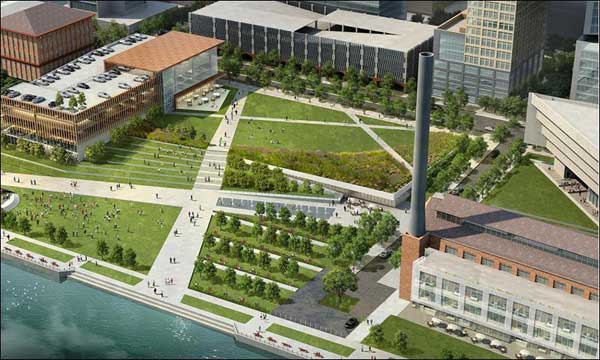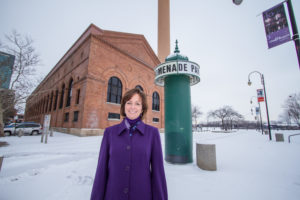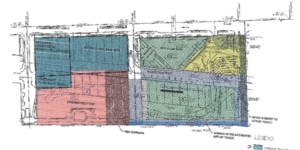
Toledo City Council voted 11-1 Jan. 20 in favor of a memorandum of understanding (MOU) with ProMedica, approving the company’s plan to move its headquarters downtown and build a garage at Promenade Park.
Councilman Jack Ford was the lone no vote, indicating he wanted clearer answers regarding the likelihood of getting minority inclusion and restoration provisions added to the agreement before he was comfortable supporting the project.

Two amendments were briefly discussed at the beginning of the meeting — Ford suggested a minority inclusion provision and Councilman Mike Craig suggested giving maintenance responsibility of the park to ProMedica — but both men pulled their amendments.
Council also briefly discussed an email from former Judge James G. Carr, which asked Council to consider adding a restoration provision, which would return the park to the city and have ProMedica responsible for razing the garage if the company left the site within 25 years.
Council agreed to discuss those and other topics during the next stage of negotiations, which is a development agreement.
RELATED: Read the ProMedica MOU Toledo City Council voted on here.
The next step is putting together a development contract, which is expected by April and must be approved by City Council. Construction could start as early as November, expected to be completed by 2017.
After the meeting, Robin Whitney, ProMedica’s vice president of property acquisition and development, said she appreciated hearing the perspectives of those who opposed a garage being built at Promenade Park, but hopes the end result will satisfy them.
“I hope one day when we get this project done they’re going to like it,” Whitney said. “That’s really still my goal. I think we’re going to be improving the park and really making it an amenity and I believe that we can still do that. I haven’t given up hope that I can get them converted and be supportive of what we’re doing.”
Before the vote, Ford questioned City Development Director Matt Sapara about Carr’s suggested “return, remediate and restore” proviso. Sapara said he had not yet seen the email.
“I’m not exactly sure what the development agreement will look like, but I know that there is still further discussions to be had,” Sapara told Ford.
Ford also questioned Sapara about his own suggested minority inclusion provision, which asked that ProMedica make “all reasonable efforts to meet and/or exceed a level of 15 percent of minority business enterprise participation in the selection of contractors and subcontractors in this project and to meet or exceed a level of 10 percent minority business enterprise participation in overall purchases, materials, supplies and services required as part of this project.”
“Can you tell us that the final agreement will have a strong minority inclusion plank in the agreement?” Ford asked.
“I can tell you, Councilman, there are other things that will be added to the development agreement that aren’t included in the memorandum of understanding,” Sapara said. “I know that ProMedica right now is working on that inclusion policy. I don’t know what the final agreement will look like, but I can tell you the development agreement will have to come back to Council for its consideration.”
“So is your answer you don’t know?” Ford shot back.
“The answer is there will be things in the development agreement that aren’t in the memorandum of understanding,” Sapara repeated.
“Neither one of his responses satisfy my concern,” Ford told Council. “I’m not going to bring them forward unless the majority of the Council is ready to say clearly they support minority inclusion in the first document and I was getting various reasons as to why now is not the time. When you look at the lack of minority inclusion in some of the big projects, I think it’s always the time. So I’m disappointed in that.”
Many Council members expressed support for such an amendment, but said it would be more appropriate during the next stage of negotiations.
During the vote, Ford started to explain — “I’m voting no till I see the development agreement” — but was cut off by the rest of the roll call.
ProMedica is already working on a diversity inclusion policy, Whitney confirmed after the meeting.
“We have a diversity office and we’ve already been working on what our diversity plan is,” she said. “We don’t have that ready to share yet, but we’re certainly thinking broadly. As was stated today, we want to include women’s business enterprises and minority business enterprises as well, so we will certainly be able to share our plan in the very near future.”
Regarding park maintenance, Whitney said she was satisfied with the current MOU language, which calls for the city to maintain Promenade Park, but allows ProMedica to step in and supplement maintenance at its own cost if the city’s maintenance isn’t up to its standards. However, she said ProMedica is open to further discussion.
“I think the park maintenance is something we can continue to discuss,” Whitney said. “We thought the language (in the MOU) was the best of both worlds. We feel the city probably should be maintaining the park since they will be controlling it and doing programming in it, but that also gives us the ability to add to that and supplement it if we like. But we’re open to further dialogue on it.”
Whitney said she hadn’t seen Carr’s proposal regarding restoration yet, so couldn’t comment.
During remarks before the vote, Council President Paula Hicks-Hudson called ProMedica’s move a game changer and a “magnificent change” for Downtown Toledo’s waterfront. Councilman Tom Waniewski said he was “disappointed by the last-minute jockeying” with amendments, and evoked Edward Drummond Libbey and Michael Owens, two of the pioneers behind Libbey-Owens-Ford, and the impact their investment and development still has on Toledo.
“This is really an opportunity for us to make history today. It’s not a vote for ProMedica or against ProMedica. It’s a vote for Toledo,” Waniewski said. “If you look at history, the Libbeys and the Owenses saw our water as an asset for their commerce and we’re still reaping the benefits of Libbey’s and Owens’ investments. Now we have another corporate partner who is attracted to the water for the commerce and to make a great campus setting for them. … This is an opportunity for us to repeat the history that the Libbeys and the Owenes started for us using that water. It’s time to move forward.”
Councilwoman Sandy Spang thanked the green space advocates, some of whom were in attendance at the meeting, who had spoken on behalf of saving Promenade Park during previous meetings.
“To those who spoke to the importance of preserving and enhancing our waterfront I want to thank you for being a part of the conversation,” Spang said. “You shed light on a principle that is important and that we must keep before us as we continue to develop Downtown.”
























